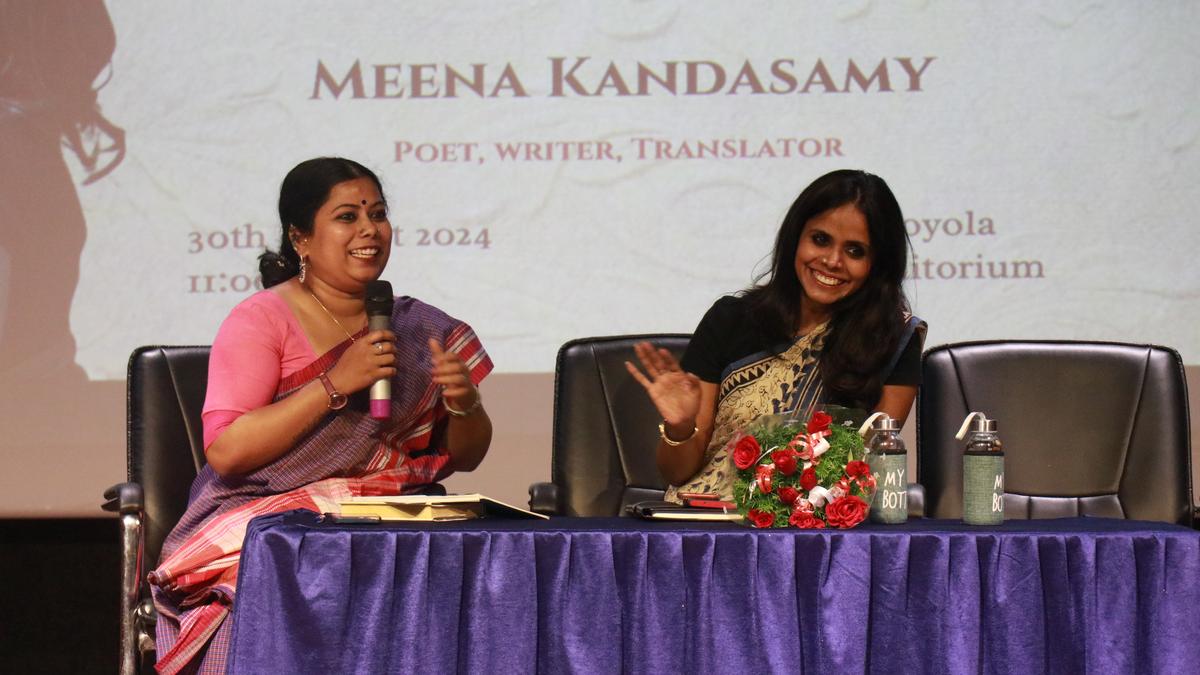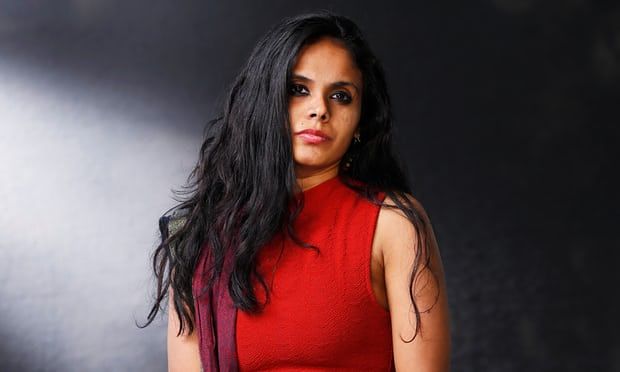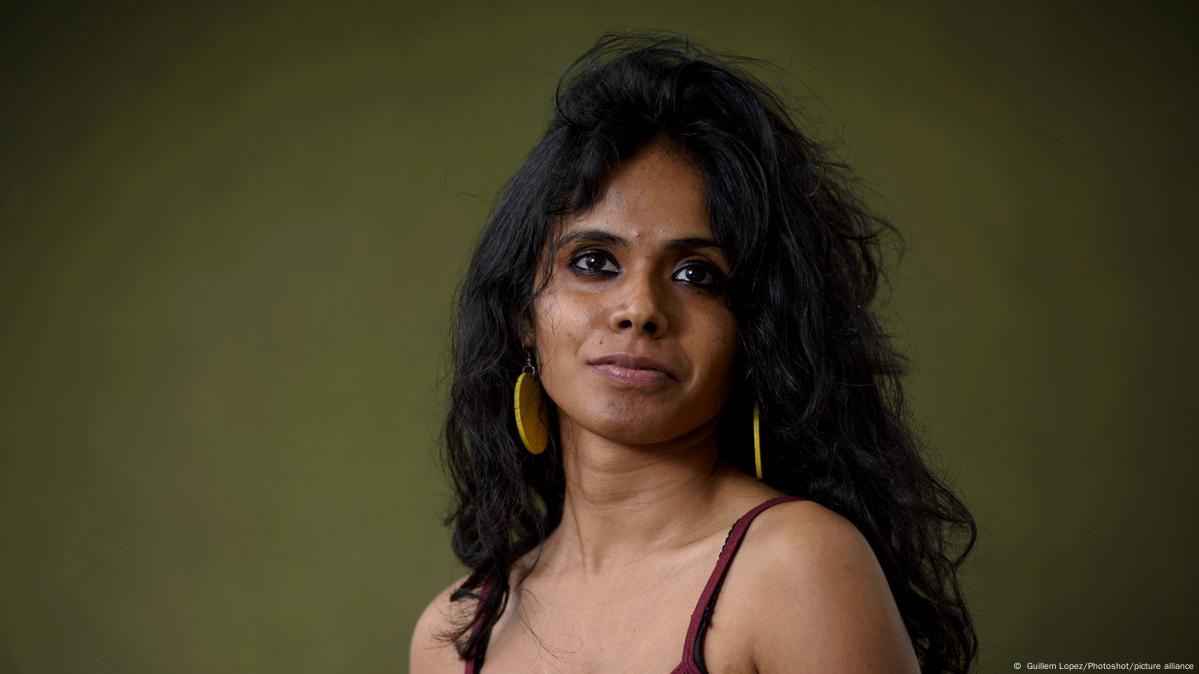Meena Kandasamy, the name that became a synonym of desperate struggle and lyrical genius, is one of the strongest voices of India nowadays. As a Tamil writer Meena Kandasamy, poet and activist, and feminist author, she has challenged the definitions of Indian feminist literature by her explicit writings on caste, gender, and social injustice. Raw and intellectual, her work, whether it is Meena Kandasamy’s books or Meena Kandasamy poems or Meena Kandasamy novels, is a call to action.
This article of vitatales delves into Meena Kandasamy’s life story, her early life, activism, Meena Kandasamy awards, and the profound impact of Meena Kandasamy on Indian literature, while highlighting how she uses poetry for social change and amplifies Dalit feminist voices.
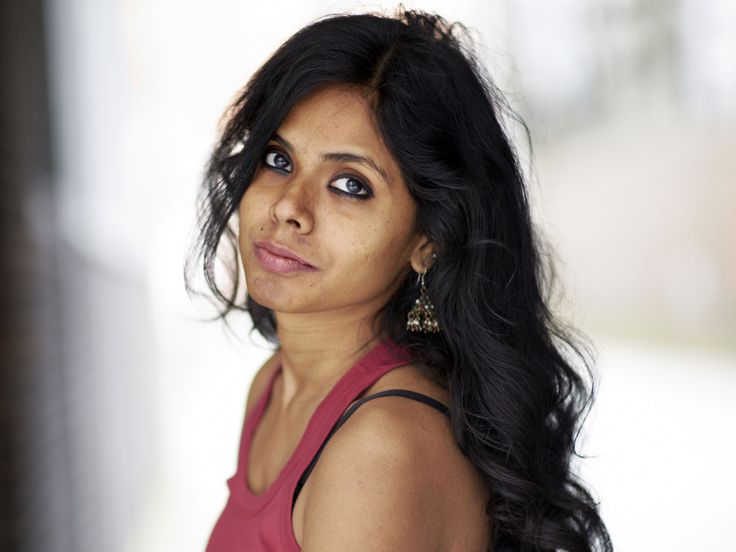
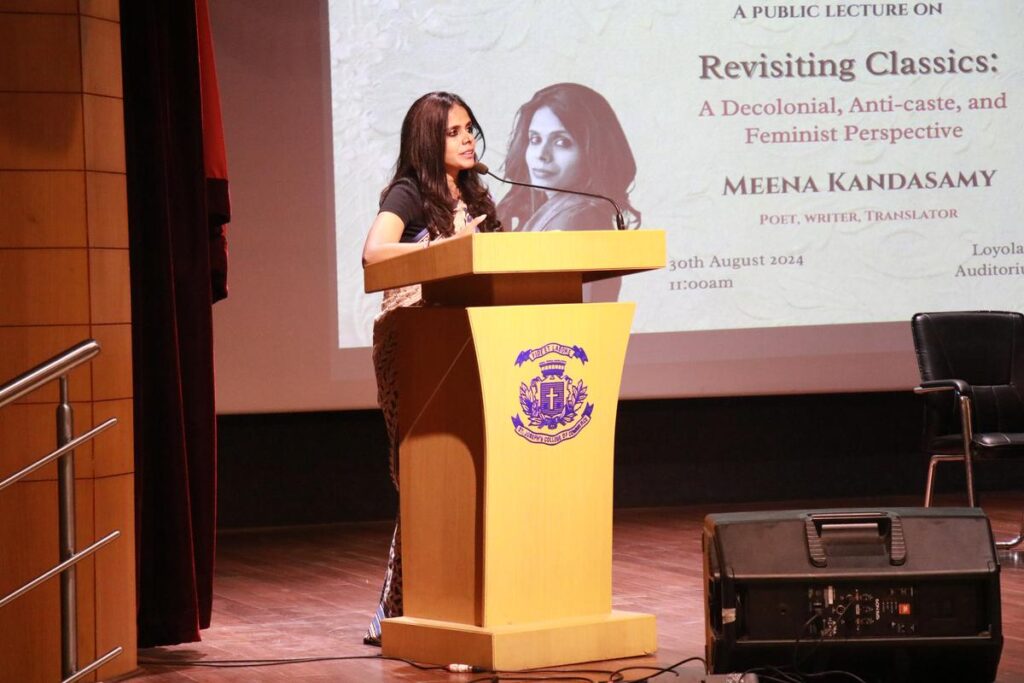
Early Life and Education of Meena Kandasamy
| Field | Details |
|---|---|
| Date of Birth | 1984 |
| Place of Birth | Chennai, Tamil Nadu, India |
| Education | PhD in Socio-linguistics, Anna University |
| Associations | Dalit Panthers, The Dalit, Royal Society of Literature |
| Age (as of 2025) | 41 |
| Nicknames | Meena |
| Epithets | Poet and Activist, Feminist Author |
| Prominent Achievements | Touch, When I Hit You (Women’s Prize shortlist), PEN Translates (2018), FRSL (2022) |
| Hometown | Chennai, India |
Meena Kandasamy Early Life: Roots of Resistance
Meena was born in 1984. Meena Kandasamy early life was shaped in the state of Tamil Nadu in Chennai in a family that went against the social convention. Meena’s parents are university professors who were symbols of resistance since they were of mixed caste. Her nomadic Andi Pandaram tribe father became the first in the family to complete a PhD in Tamil literature, and her maternal grandparents were lower-caste Shudras who defied caste norms by marrying and temporarily moving to Ethiopia, where her mother was born.
This revolt against the caste system has become a very strong part of the perception of Kandasamy. At 17, she started to write poems, and she took the name Meena as a way of revering her Tamil self. Meena’s activism is rooted in the academic rigour of her obtaining a Doctorate of Philosophy in Socio-linguistics, conferred by Anna University, Chennai.
Meena Kandasamy Activism: A Voice for the Marginalized
Meena Kandasamy poet and activist, her work cannot be dissociated from her struggle against caste and gender oppression. Meena Kandasamy view on caste and gender criticizes the Brahmanical Hindu system and reveals how it has contributed to inequality. She writes of Dalit women that they are “twice Dalit” since they are oppressed on both counts of caste and gender, an understanding that she developed when she was the editor of The Dalit, a bi-monthly alternative English magazine between 2001 and 2002.
Being a member of the Dalit Panthers of India Meena Kandasamy and Dalit feminist voices consider poetry as a tool of social change because she sees it as a form of expression without academic boundaries, and thus Kandasamy uses poetry for social change, she can release her unprocessed anger and pain. However, she has become strong-willed in the face of these threats because of her outspokenness, and she says that, “This threat of violence should not influence what you are going to write.”
Books Written by Meena Kandasamy: A Literary Legacy
Kandasamy’s oeuvre—Meena books, poems, and novels— is a marker of her flexibility and her determination towards justice. Her significant works have been discussed below, including Meena Kandasamy poems summary and key texts like Touch by Meena Kandasamy summary and Meena Kandasamy When I Hit You.
Meena Kandasamy Poems and Poetry Collections
- Meena Touch (2006): Her debut collection, Touch by Meena, foreword by Kamala Das, it contains 84 poems on caste, untouchability, and desire. The title poem, Meena Kandasamy Touch, criticizes the fact that the caste system forbade even physical contact, and he concludes with the heartrending line: But, you will never have known that touch The taboo to your transcendence, when crystallized in caste was a paraphernalia of undeserving hate.
The Touch by Meena Kandasamy summary praises its clear language and the unashamed attack on the stigma of caste, but a few criticized it by saying there were small mistakes in English. - Ms. Militancy (2010): This collection reimagines Tamil and Hindu myths through a feminist and anti-caste lens. The poem Mascara by Meena Kandasamy, a national prize-winner, depicts a woman doing makeup, and then is violated, as a symbol of strength. The collection has earned praise as “explosive” as other poems, such as the title piece, which is based on Kannaki of Silapathikaram fame, and displays the militant wit of Kandasamy.
- #ThisPoemWillProvokeYou & Other Poems (2015): A chapbook of provocative verses, reinforcing her rebellious tone.
- Tomorrow Someone Will Arrest You (2023): A gathering of poems written between 2011 and 2022, the work is a retrospective of defiance and suppression, which solidifies Kandasamy as a worldwide poetic powerhouse.
Meena Kandasamy poems summary: Her work, termed as naked and crying, uses a combination of wit and wordplay alongside fury to caste and patriarchy. Poems such as Ekalaivan and Liquid Tragedy: Karamchedu 1985 draw attention to caste atrocities, whilst Aggression looks to rebellion: “Sometimes, the external symptoms of internal conflicts takes monumental shapes / And the revolution occurs as our dreams are blown apart.”
Meena Kandasamy Novels
- The Gypsy Goddess (2014): The first novel of Kandasamy tells the story of the Kilvenmani massacre of 1968, in which 44 Dalit workers were burnt to death because of went on strike. Inspired by Kurathi Amman, her inherited deity, it is part fiction, part critique, and has been widely acclaimed as a “gorgeous” narrative and shortlisted for the DSC Prize for South Asian Literature.
- When I Hit You: Or, A Portrait of the Writer as a Young Wife (2017) is an autofictional novel based on the Meena Kandasamy marriage of the author, and reveals the theme of domestic violence and marital rape in India. A finalist in the Women’s Prize (2018), it was praised by The Guardian as a book of the year due to its generality about abuse. Kandasamy pseudonymized the narrator and said, Being feminist, outspoken, successful, loud was no protection against violence.
- Exquisite Cadavers (2019): A fractured novel about her own creative process, it takes a split-page structure informed by Jacques Derrida to deal with both personal and political stories, such as Brexit and the case of Shamima Begum.
Essays and Translations
- The Orders Were to Rape You: Tigresses in the Tamil Eelam Struggle (2021): Essays on female militancy in the Tamil Eelam struggle, supported by an Arts Council grant.
- Translations: Such works by Dalit leader Thol have been translated by Kandasamy. Talisman (Thirumavalavan), Why Were Women Enslaved? (Periyar E.V. Ramasamy), and poets such as Salma (Women, Dreaming) and the Thirukkural: The Book of Desire (2023). Her translation gives voice to the marginalized and she has won a PEN Translates award (2018).
Meena Kandasamy Poem: Spotlight on “Touch” and “Mascara”
- Meena Kandasamy: The first poem of her collection employs meditation to criticize caste in regard to how the skin of the body aligns the speaker to the oppression of caste. Touch is one of its closing lines as a paraphernalia of undeserving hate in the birther caste hierarchies.
- Mascara by Meena Kandasamy: This prize-winning Meena Kandasamy Poem portrays a woman’s resilience amid violation, utilizing makeup as a metaphor of resistance. The richness of lavish imagery and emotional richness identify to the extent that Kandasamy is capable of making ugliness beautiful.
Meena Kandasamy Awards: Global Recognition
Kandasamy’s contributions have earned her numerous accolades:
- Poems like Mascara by Meena and “My Lover Speaks of Rape” won first prizes in all-India poetry competitions.
- Meena Kandasamy When I Hit You has been shortlisted, shortlisted, or shortlisted unveiled in the Women’s Prize for Fiction (2018), the International Dylan Thomas Prize, Jhalak Prize, and Hindu Lit Prize.
- She has won a PEN Translates award (2018) for the translation of Salma Women, Dreaming.
- In 2022, she was appointed a fellow of the Royal Society of Literature (FRSL).
- Her international standing is contributed to by fellowship experience at the University of Iowa International Writing Program and the University of Kent Charles Wallace India Trust.
Meena Kandasamy Blog and Digital Engagement
Meena Kandasamy blog (meenakandasamy.wordpress.com) features early poetry, including Meena, thoughts about caste and love. Not so active lately, it is still a window of her young years. On X, where there are always about 100,000 followers, she provides information on Meena Kandasamy books and reviews casteism, witnessed when she posted an article in 2020 that discussed how the Brahminical ideologies define her as a writer-activist.
Meena Kandasamy Marriage and Personal Life
Kandasamy’s Meena Kandasamy marriage, detailed in When I Hit You, was marked by abuse, which she describes as a footnote in her Meena Kandasamy life story. She has two sons with her present husband, Meena, who were born in 2016 and 2018, and resided in the UK and New York, where she served at NYU. She relegates personal information and makes her experiences universal in writing to concentrate on institutionalized problems.
| Also read about: Avni Doshi battled years of rejection before rising to fame with her Booker-shortlisted novel Burnt Sugar. |
How Meena Kandasamy Uses Poetry for Social Change
How Meena uses poetry for social change is central to her legacy. Meena’s poems deny decorum and require action on raw emotion. She reappropriated stories of the margins by recounting myths and revealing tragedies such as the Karamchedu massacre. Her poetry, which can be termed as a weapon, challenges the readers to battle against the caste and gender inequality, such as in the poem, Aggression, which pictures the dreams of revolution bursting into acts.
Meena Kandasamy and Dalit Feminist Voices
Meena Kandasamy and Dalit feminist voices are mixed up, since she gives voice to the plight of Dalit women. She criticizes the nature of caste and gender mix in her work and urges equality and fraternity. Through her translation of Dalit and Tamil literature, these underrepresented voices are made to reach international audiences, and the “monopoly” of upper-caste voices in Indian literature is broken.
Impact of Meena Kandasamy on Indian Literature
The impact of Meena on Indian literature is transformative. As a Meena Kandasamy Indian writer and feminist author, she has redefined Indian feminist literature by centering non-dominant caste women. Expanding the aesthetics, her innovative style that presupposes an admixture of the auto fiction, experimentation, and militant poetry makes the traditional aesthetics challenging.
Her daring narration is the acclaimed feature of The Gypsy Goddess and also of the book When I Hit You, whereas her translations have internationalized the voices of Tamil and the Dalits in 18 languages across the world. In comparison to Sylvia Plath and Langston Hughes, Kandasamy belongs on the list of indispensable forces as she does not want to distinguish between art and politics, and drives readers mad with a necessity to change.
Meena Kandasamy Views on Caste and Gender: A Call to Action
Meena Kandasamy views on caste and gender are uncompromising. She deplores the Brahmanical system and inequality embedded in it, calling for caste destruction and equality between the sexes. Meena’s poems and novels demand that their readers tear down such hierarchies, and thus her role in justice has been made today.
Conclusion
Meena is a revolutionary writer in Indian feminist literature, a Tamil writer, poet and activist, and a feminist writer. Her Meena’s books, poems, and novels, Touch to When I Hit You, are fearless in dealing with oppression of caste and gender. With the help of Meena Kandasamy activism, she stands out as a Dalit feminist and uses poetry as a binding social tool.
Her worldwide translations and blogging are evidence of the extensive impact of her Meena Kandasamy awards. Meena has made an extraordinary contribution to Indian literature, to the extent that she has become the indispensable voice of present-day literature. Her words enrich and ignite people to revolution, as her writing shows that art can transform the world.
Frequently Asked Questions (FAQs)
What is the theme of the poem Meena Kandasamy?
The main themes in Meena’s poetry are caste annihilation, feminism, and resistance against oppression. She uses her writing to challenge social injustices, particularly those related to caste discrimination and gender inequality in India.
What is the thesis of Meena Kandasamy?
Meena’s primary thesis revolves around challenging and dismantling the systems of oppression in India, particularly caste-based discrimination and patriarchal structures.
What is the theme of the poem touch by Meena Kandasamy?
The poem “Touch” by Meena explores the themes of caste discrimination, gender inequality, and the suppression of marginalized communities, particularly Dalit women, within the Indian social structure.
When I hit you, Meena Kandasamy?
Meena ’s When I Hit You (full title: When I Hit You: Or, A Portrait of the Writer as a Young Wife) is her second novel, first published in May 2017.


